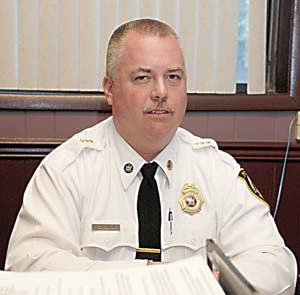By Dan Hust
MONTICELLO — Monticello Police Chief Doug Solomon may be sticking around longer than he thought.
A month ago, he submitted a letter to the Village of Monticello saying he intended to retire on or about August 8, but he said yesterday that those plans are now on hold.
The village is balking at reimbursing him for the 259 sick days he hasn’t used in his nine years as chief, and Solomon isn’t willing to leave until the matter is resolved.
“They made me an unofficial offer to pay me for 150 days,” Solomon explained. “It’s a gracious offer, but it’s not what I feel I’m entitled to.”
The difference between the two payouts is around $20,000, estimated Village Manager John Barbarite.
That 150-day maximum, Barbarite added, is based on a resolution passed by the village board in the 1980s. He said that it pertained to non-unionized administrators who don’t have a separate employment contract with the village.
It happened with former Village Clerk Edith Schop when she left Monticello’s employ, Barbarite explained.
“She lost about 100 days [of unused sick time],” he said.
In Solomon’s case, however, the matter is complicated by the recent repeal of Section 207-m of the state’s General Municipal Law.
The law stated that chiefs of police supervising unionized forces were entitled to salary increases equal to those given to their highest subordinates.
The law’s intent was to keep non-unionized chiefs’ pay consistently above those of their unionized employees.
As part of the so-called mandate relief in his much-touted property tax cap legislation, Governor Andrew Cuomo and the State Legislature removed that section of the law just a few weeks ago.
The Monticello police union’s agreement with the village entitled members to unlimited sick days, and Solomon is arguing he deserved the same, since he accrued those days back when Section 207-m was law.
The village, said Barbarite, is arguing that its 150-day-maximum rule applied even during that time.
Barbarite (who continues to plan his own August retirement) and Solomon said it’s now in the hands of the involved attorneys.
“I’m under the impression this is going to take quite some time,” said Solomon.
As a result, he believes he’s lost his private-sector security job he had lined up after retirement.
“I was a little upset at first,” he admitted of the village situation, “because I’ve given that job my all.”
But since announcing his departure, he’s repeatedly been asked to remain.
“It’s been really touching, all the people who’ve come forward and asked me to stay,” Solomon said, adding such comments “really recharged my batteries.”
“So I’m not going to walk around with my head held low,” he remarked. “I’m going to bounce back.”
He said Mayor Gordon Jenkins also asked him to stay – but evidently that’s with mixed emotions.
“He’s doing a good job,” the mayor assessed, “but he has to be a little more aggressive.”
Jenkins was planning to “revamp” the department once Solomon left, desiring officers to interact more with village residents.
“I want officers in this village to get out of those patrol cars and walk the village,” Jenkins explained. “... I want the cops out on the street walking, integrating more with the community and socializing.”
The mayor said his constituents tell him they “are afraid, that there’s not enough of a [police] presence.”
“It’s not my job to micromanage the chief,” he added, “but I’ve always been talking about more patrolling.”
Jenkins also said he thinks paying Solomon for 259 unused sick days is exorbitant.
“How can we pay these kinds of payouts to people?” he wondered, worrying it could eventually bankrupt the village.
He’s advocating for a policy of “use it or lose it.” He added that he’s not accusing Solomon or anyone else of wrongdoing, but he’s intent on seeing an employment policy shift.
“My job is to have some accountability in this village and make sure people aren’t getting those big payoffs,” Jenkins remarked. “It has to stop.
“The ‘gravy’ is over, as far as I’m concerned.”



